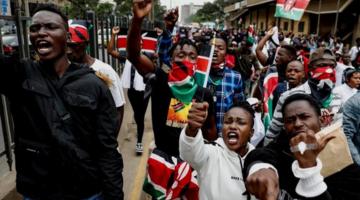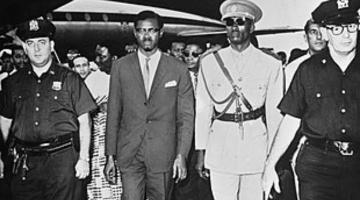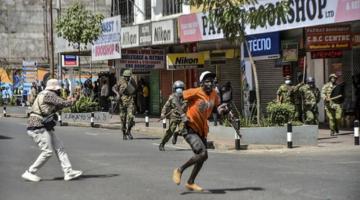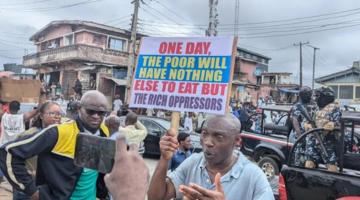The Kenyan government now demands that the United Nations pay for the deployment of a police force to Haiti. But Black face imperialism is the problem, not negotiations over money.
The decision by President Ruto and his government to deploy 1000 Kenyan police officers to Haiti has ignited a storm of outrage and condemnation from the majority of Kenyans, both at home and within the Communist Party of Kenya. This move is perceived as a betrayal against the heroic people of Haiti, with the Communist Party firmly asserting that the crisis in Haiti is not merely a result of gang violence but a deliberate problem orchestrated by the imperialist core group, led by the United States and Canada.
Unravelling Haiti's Struggle
To fully understand the gravity of this deployment, we must delve into the historical context of Haiti. The country, the first independent black republic in the world, achieved its freedom through a successful slave revolution in the early 19th century. However, this triumph over oppression has marked Haiti for continued interference and retaliation by imperialist forces. The lingering resentment from colonial powers, particularly France, has manifested in ongoing attempts to destabilize the nation and curtail its sovereignty.
Legal Opposition: Constitutional Boundaries and Public Outcry
The Communist Party of Kenya, in solidarity with Haiti, has taken a principled and militant stand against this deployment, supported by legal actions such as the court case filed by Third Way Alliance. These legal manoeuvres have resulted in temporary orders halting the government's plan. The orders are grounded in sections of the Kenyan constitution that limit the police service to operate within our territorial borders, reinforcing the principle that national forces should serve the interests of their citizens, not those of foreign powers.
President Ruto's Alignment with Western Interests: "Joe Biden Boy"
President Ruto's leadership, characterized by aligning with the interests of Western imperialism, has led to the Kenyan government being labelled as lackeys of the Western powers. Ruto's consistent support for the United States ruling class, evident in his recent backing of the Zionist project and deafening silence about the ongoing genocide in Gaza, has earned him the nickname "Joe Biden boy" among the Kenyan people. This aligns with a broader pattern of leaders in post-colonial nations being co-opted by foreign powers to serve their agendas.
International Complicity: UN Security Council's Rubber Stamp
The subsequent approval of the deployment by the UN Security Council underscores the capture of international bodies by imperialist forces. This move, perceived as a rubber stamping of decisions made by powerful nations, further erodes the credibility and democratic principles of the United Nations. The Communist Party exposes the government's motivation for this move, citing Interior Minister Kithure Kindiki's statements before the Administration and Internal Security Committee, highlighting potential profits for the Kenyan government.
Concerns from Within: Kenyan Police Apprehensions
Interviews within the Kenya National Police Service reveal deep concerns among officers, labelling the mission as dangerous and not worth the potential consequences. Progressive voices in Kenya warn of devastating effects, urging the government to reconsider its involvement in advancing the United States' imperialist agenda. This internal dissent emphasizes that those who are to execute this mission are wary of its implications and foresee the potential hazards it may bring to both the Kenyan police force and the people of Haiti.
Ruto's Rhetoric: Pan-Africanism or Foreign Alliances?
President Ruto's attempts to sway public opinion with rhetoric about Pan-Africanism and black solidarity are deemed unconvincing, given his track record of speaking contrary to his actions. The Communist Party exposes Ruto's double standards, accusing him of being captured by foreign interests, particularly the IMF and World Bank. This highlights the recurring theme of leaders using grandiose speeches to mask their compliance with external powers.
Distrust in the Kenyan Police: A Force Marred by Corruption
The Communist Party of Kenya expresses a lack of trust in the Kenyan police, known for corruption, unprofessionalism, and human rights violations. Recent incidents of police violence during demonstrations further highlight the force's incapacity to handle pro-people missions. The Party asserts that deploying such a force to Haiti will only serve as a front for the United States' occupation strategy.
Imperialist Designs on Haiti: A Precarious Future
In conclusion, the Communist Party of Kenya sees the Kenyan government's collaboration with the United States as a new means of maintaining global hegemony. The deployment is predicted to worsen the crisis in Haiti, with the Party vowing to hold those responsible accountable in both Kenyan courts and the court of public opinion as the inevitable body bags arrive from Port-au-Prince to Nairobi. This intervention, motivated by imperialist designs on Haiti's resources, threatens not only the stability of the Haitian nation but also the credibility and integrity of Kenya's commitment to principles of justice and sovereignty.
Department of Propaganda of the Central Organizing Committee (DPCOC) of the Communist Party of Kenya (CPK)
The Communist Party of Kenya (CPK) is a political party registered in accordance with the Constitution of Kenya and Political Party’s Act of 2011. CPK is committed to uniting all Kenyans irrespective of their ethnic groups, class, gender and age to work for an alternative society away from the present unjust system; towards a society that realises the freedoms, human rights and development of each and all.



















